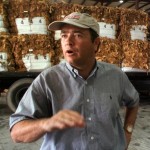On afternoon last week, I was leaving the seventh floor courtroom at U.S. District Court after Judge James Spencer called for a break. Jonnie R. Williams Sr., the prosecution’s star witness against former Gov. and Ms. McDonnell, had been on the stand for hours, playing various roles as remorseful solicitor, confident businessman, and obstructionist witness.
It just so happened that Williams and I were going to cross paths in the crowded outchamber of the courtroom. Without missing a beat, Williams stopped walking, made eye contact with me, and graciously held out his arm to signal that I should pass first.
I have no idea if Williams knew who I am, but the summer before, I had tried repeatedly to interview him for a serious of reports I was writing about Star Scientific, the tobacco company turned dietary supplement that is at the core of the trial against the McDonnells in perhaps the most important ever corruption trial in Virginia history.
Williams, 58, had been on the stand for four days, dressed as always in a shiny, expensive suit, his thinning hair coiffed around a high, bulbous forehead.
He has a strange voice, soft and proper, that sounds at times like an elder Marlon Brando or, without the harshness, Strother Martin, the man who played the cruel prison warden in the Paul Newman movie “Cool Hand Luke.” Either way, Williams does have a remarkable presence and he always seems to be selling, selling, selling something — either Anatabloc, his product that he claimed could do anything from cure Alzheimer’s to MS, or simply to promote his own persona.
Williams, who has extensive immunity from the government, keeps underlining that his deal that could keep him out of jail, which means he must be honest. Honest means making “mea culpas.” They must sound sincere. When he said he pressured Maureen to get Bob to call his aging father on his 80th birthday, he recalled: “That cost me hundreds of thousands of dollars to be able to do that,” he said. “The McDonnells were not my personal friends. It was good for my company,” noted Williams, who gave them more than $150,000 in gifts, loans, trips and cash.
That’s one version of Jonnie — pensive, regretful, honest. There was another one as well that came out when defense lawyer William Burck asked him to talk about his background in business. It was ego bait that Williams couldn’t resist.
It all came out — the confident kid from Fredericksburg who went to a little known business college in Rhode Island and came home to sell used cars and then took over a faltering eyeglass shop, learning how to pick up on one entrepreneurial idea and spin it into another.
Name dropping is a critical part of the Williams psyche, showing how impressed Williams was that his keen intellect had attracted helpful personalities far beyond his social kin. He keeps mentioning Johns Hopkins University Medical School and the “very bright” Dr. Frank O’Donnell who somehow came down from Baltimore and met Williams when he was working in the optical business. O’Donnell was a big league ophthalmologist, Williams said, and served as his mentor, even when he moved to the Midwest. Dr. O’Donnell came in with one business deal after another. One helped lead him to making machinery to cure near-sightedness, earning him millions and securing his personal finances.
Perking up during testimony, Williams ticked off medical terms as if he were the head of a medical school department. He also had developed a keen sense of what could and could not be said in good company, sort of like a small town boy of modest background who’s being let into the local country club for the first time.
When he took the McDonnells and a few others to La Grotta, an expensive Italian restaurant in downtown meeting after an Anatabloc session, he picked thousands of dollars’ worth of wine and informed the courtroom and jury that it was bad form to let your guests know if it’s $50 a bottle vintage of $500 a bottle. Of course, when he picked out the Louis XIII cognac for his male model friend, the McDonnells and some of their staff at a New York eatery in 2009, he was proud to reveal it cost $5,000.
“I really didn’t like it all that much but some people do,” he said. He also didn’t really like the Ferrari that he made a big effort to drive to Smith Mountain Lake in July 2011 so McDonnell could drive it at Maureen’s request while vacationing for free at Williams waterfront house. Williams says he prefers his Toyota Camry.
This same snobbery constantly extends to the medical and business hot shots who were helping build the idea that Williams’ use of anatabine, a substance found in tobacco, had remarkable curative powers. Jonnie was more than willing to tell you all about it, over and over, in his slow, calm, methodical voice.
Maureen McDonnell, who is being set up as the Fall Girl by her own lawyers, bought into the Williams’ spiel, big time. McDonnell’s professional staff, including Phil Cox and Jasen Eige, testified that they were deeply worried about Williams and kept on telling the governor to limit his engagement.
Smitten by Williams, Maureen kept pushing Jonnie and his miracle supplements, somehow overlooking the fact that there hadn’t been clinical trials on it and that Star Scientific had lost $230 million over the past decade (she still bought stock anyway despite Williams testimony that he told her it was a bad idea).
Rank and file Virginia researchers, whose imprimatur Williams so badly wanted, also were suspicious. When he’d show up pushing pills as samples, they called him the “Tic Tac Man.”



